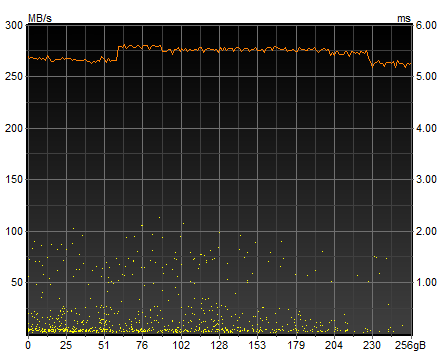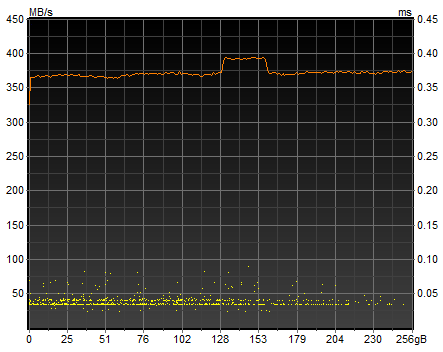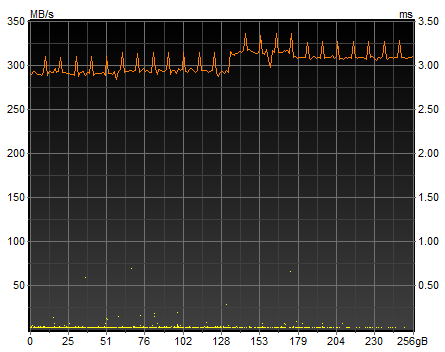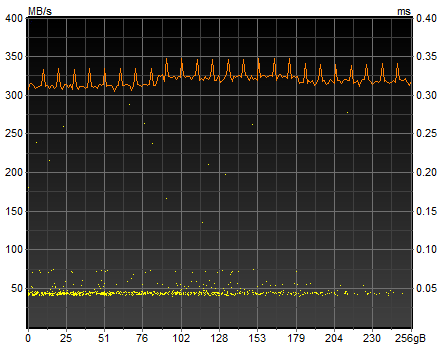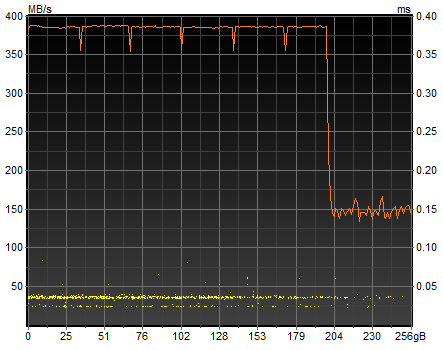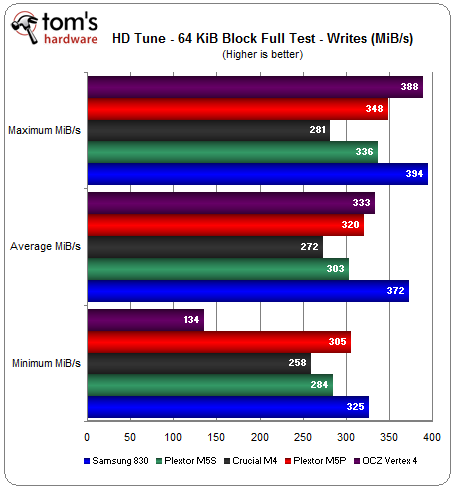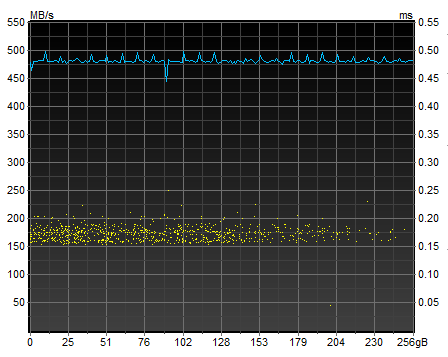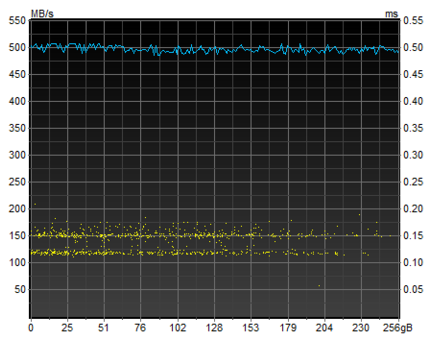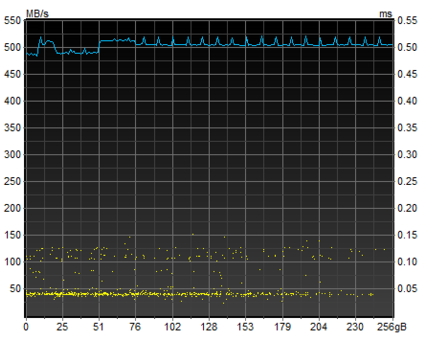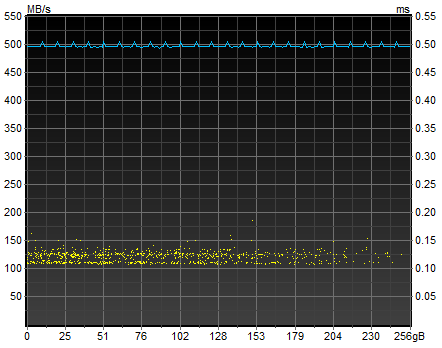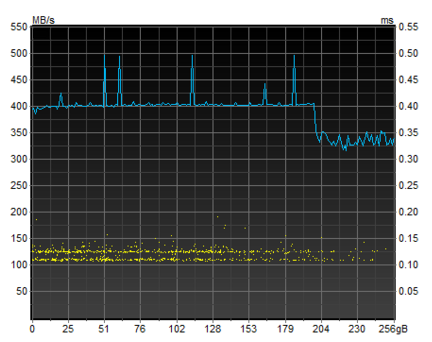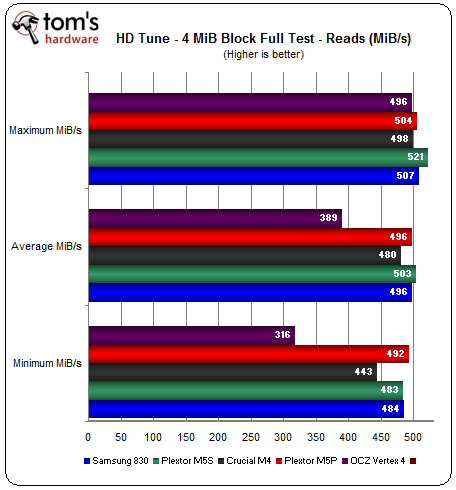Plextor M5 Pro 256 GB Review: 19 nm NAND And Marvell's Latest
Hot on the heels of its M5S, Plextor sent us the M5 Pro. Loaded with hot new technologies like 19 nm NAND and the latest Marvell controller, the company's flagship was certainly worth waiting for. How does it do against the established incumbents, though?
Benchmark Results: HD Tune
We benchmark with HD Tune Pro over the full span of the drive using a 64 KiB write access pattern. What we're looking for is consistent write performance.
The test involves writing data to every sector of the drive while measuring speed and latency. In the graphs below, the orange line represents write performance and the yellow dots indicate the write access time.
Crucial m4
Samsung 830
Plextor M5S
Plextor M5 Pro
OCZ Vertex 4
Get Tom's Hardware's best news and in-depth reviews, straight to your inbox.
Up until now, our benchmarks have left plenty of free space on each drive. It's only when we use HD Tune to write across the full span of our contenders that we see OCZ's Vertex 4 stumble as it switches from SLC to MLC mode (for an explanation of this, check out this page).
Although the 256 GB Vertex 4 is better able to mitigate the impact of the switch-over than the 128 GB model, there is still a performance degradation as free capacity is consumed. The phenomenal write performance we saw when the Vertex 4 was in SLC mode has to be tempered by the amount of space available and the size of the writes within that free space.
Our M5 Pro doesn't dominate, but its performance is both solid and consistent. However, it allows Samsung's 830 to emerge as the fastest drive in maximum, average, and minimum write speeds.
Next, we measured read performance, filling each drive using an Iometer test file before running HD Tune. We then used a 4 MiB sequential read access pattern across the full span of each contender.
Crucial m4
Samsung 830
Plextor M5S
Plextor M5 Pro
OCZ Vertex 4
Plextor's M5S does best in average read speed measurements, while Samsung's 830 and the M5 Pro finish neck and neck.
The Vertex 4 can't compete with the M5 Pro. Its read speeds start off a lot slower than the other drives, and then drop further as the benchmark gets to the last quarter of its run.
As far as large block read transfers go, there really isn't a whole lot of variation between the drives, so user experience in that context isn't going to change much from one model to the next.
Now, let's compare our Anvil's Storage Utility and HD Tune results to each manufacturer's sequential read specifications.
| Header Cell - Column 0 | Manufacturer Specification (MB/s) | ASU (MB/s) | HD Tune (Avg MB/s) | HD Tune (Max MB/s) |
|---|---|---|---|---|
| Samsung 830 | 520 | 506 | 496 | 507 |
| Crucial m4 | 500 | 479 | 480 | 498 |
| Vertex 4 | 560 | 418 | 389 | 496 |
| Plextor M5S | 520 | 506 | 503 | 521 |
| Plextor M5 Pro | 540 | 504 | 496 | 504 |
There is no universally accepted methodology SSD vendors use to rate their products. Most specs prefaced with an "up to," and a number of different metrics can be used to generate that value.
Our ASU and HD Tune results illustrate this nicely. The most notable deviation from manufacturer specs comes from OCZ's Vertex 4. The company states that is uses ATTO to come up with its sequential read speed numbers. We ran ATTO ourselves and, sure enough, on an empty drive using a 256 MiB test file and a 1 MiB access pattern, we achieved 560 MiB/s. But, if we increased the test file size, we were unable to replicate that number.
On the other hand, while Plextor's M5S slightly exceeds its specification in HD Tune, the M5 Pro missed its mark by 36 MiB/s.
Current page: Benchmark Results: HD Tune
Prev Page Monitoring Transfers With hIOmon's Disk I/O Ranger Next Page Benchmark Results: Iometer-
You have the wrong Marvell controller listed for the crucial M4 and the Plextor M5S. This controller is new.Reply
The old one was the 88SS9174-BKK2.
http://www.tomshardware.com/reviews/plextor-m3-crucial-m4-octane-performance-pro,3178.html -
mayankleoboy1 can we have a benchmark of the time it takes to install a fresh copy of Win7+SP1 on a SSD ? Because thats the first thing a user will do after buying a new drive.Reply -
echondo mayankleoboy1can we have a benchmark of the time it takes to install a fresh copy of Win7+SP1 on a SSD ? Because thats the first thing a user will do after buying a new drive.Reply
I believe we can all assume it will take around 10-15 minutes. My old SATA2 Vertex drive can have Windows installed with all the Windows updates I want in around 20 minutes, it would be less time but I have to install all my drivers first for my motherboard :p -
SpadeM grantwarI'd love to see how this drive fares against the samsung 840 Pro.Reply
Here you go:
http://www.anandtech.com/bench/Product/665?vs=646 -
JeanLuc I was on Youtube the other day on the Corsair channel and they were showing the advantages of 'Ram cache' which was lights years faster then SSD's in therms of throughput. Could Toms consider doing an article into Ram cache as I think it would be of interest to people who have 16-32Gb systems (since DDR3 is cheap at the moment) can spare the extra system ram to cache files and software.Reply -
merikafyeah SpadeMHere you go: http://www.anandtech.com/bench/Product/665?vs=646Wow. The 840 Pro beat the M5 Pro in virtually everything according to that data. The 840 Pro does cost significantly more though.Reply -
merikafyeah JeanLucI was on Youtube the other day on the Corsair channel and they were showing the advantages of 'Ram cache' which was lights years faster then SSD's in therms of throughput. Could Toms consider doing an article into Ram cache as I think it would be of interest to people who have 16-32Gb systems (since DDR3 is cheap at the moment) can spare the extra system ram to cache files and software.TheSSDReview did something similar:Reply
http://thessdreview.com/our-reviews/romex-fancycache-review-ssd-performance-at-13gbs-and-765000-iops-in-60-seconds-flat/
No point in even comparing RAM to SSDs, as even "slow" RAM is faster than even the best SSDs by about the same amount as the best SSDs are faster than floppy disks. -
aicom This review would have been impressive if it was published 2 weeks ago. With the 840 Pro out, it simply blows the M5P out of the water. Too bad it wasn't included in the benchmark charts here.Reply
